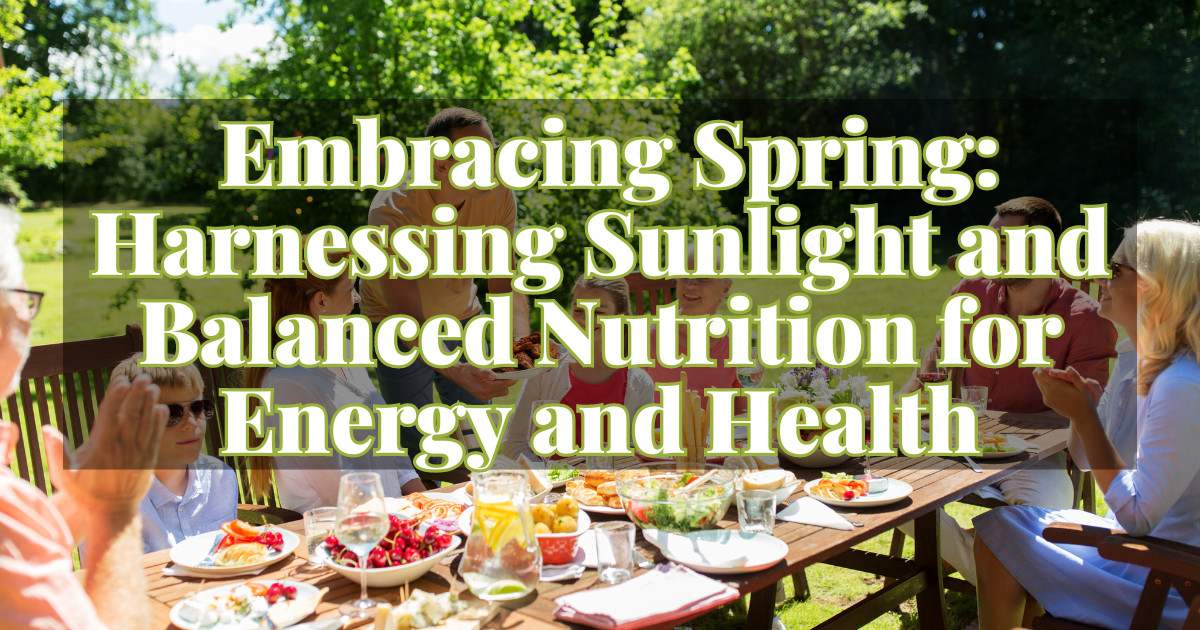
As the seasons transition and the days grow longer, spring offers us the perfect opportunity to tap into the rejuvenating power of sunlight and nourishing meals. In this blog post, we'll explore how embracing spring's natural rhythms can lead to increased energy and vitality.
Sunlight: Nature's Energy Boost
Spring brings with it longer days and warmer temperatures, coaxing us outdoors to soak up the sun's rays. But beyond simply brightening our days, sunlight plays a crucial role in regulating our internal body clocks, known as circadian rhythms. Exposure to sunlight helps synchronize these rhythms, promoting better digestion and absorption of our food.
Balanced Nutrition: Fueling Your Body for Optimal Health
Besides sunlight, spring is a time to focus on nourishing our bodies with wholesome, balanced meals. Eating three nourishing meals a day, without snacking in between, allows our digestive systems to rest and reset, promoting optimal digestion and nutrient absorption. Prioritizing whole foods like proteins, vegetables, and fruits provides our bodies with the essential nutrients they need to thrive. By embracing seasonal produce and incorporating a variety of nutrient-rich foods into our meals, we can fuel our bodies for increased energy and vitality.
Embracing the Joys of Spring
Combine the power of sunlight with balanced nutrition, and you have a recipe for boundless energy and vitality. Whether it's enjoying outdoor activities, practicing mindfulness in nature, or simply basking in the sunshine, there's no shortage of ways to embrace the joys of spring while nourishing your body and soul.
Seize the Season
This spring, let's commit to embracing the natural rhythms of the season. By prioritizing sunlight exposure and nourishing our bodies with wholesome meals, we can tap into the energy and vitality that spring has to offer. So take a moment to step outside, savor the sunshine, and nourish your body with foods that fuel your health and well-being. Embrace the season and watch as your energy and vitality soar!

Thank you for reading! This year I completed my Functional Nutrition Informed Professional Certification. It means I could add a few more letters to my name, CFNIP. But, I think the most important letters for me to share with you is F.O.O.D. If you would like to learn more about nutrition for increased energy and exceptional health the word food pops up in my book 135 times- I even have a whole chapter on Nutrition. In my Exceptional Holistic Health Membership program, I have a Bonus that includes 8 weeks of lessons that include a weekly video training, weekly menu, shopping list, and recipes. Perfect for you this spring.
These papers offer valuable insights into the relationship between sunshine exposure, meal timing, snacking behavior, and the circadian rhythm, highlighting the importance of aligning lifestyle habits with natural biological rhythms for optimal health and well-being.
- "Effect of meal timing on the expression of clock genes in human peripheral blood mononuclear cells" by Bandin, C., Scheer, F. A. J. L., et al. (2015). - This study investigates the impact of meal timing on the expression of clock genes in human peripheral blood mononuclear cells, shedding light on the relationship between meal timing, circadian rhythm, and metabolic health.
- "Meal Timing and Frequency: Implications for Cardiovascular Disease Prevention: A Scientific Statement From the American Heart Association" by St-Onge, M. P., Ard, J., et al. (2017). - This scientific statement from the American Heart Association explores the implications of meal timing and frequency for cardiovascular disease prevention, emphasizing the importance of aligning meal patterns with circadian rhythms for optimal health.
- "The impact of meal timing on cardiometabolic syndrome indicators in shift workers" by Puttonen, S., Viitasalo, K., et al. (2019). - This research paper examines the impact of meal timing on cardiometabolic syndrome indicators in shift workers, highlighting the potential benefits of aligning meal patterns with the body's circadian rhythm.
- "Eating patterns and type 2 diabetes risk in men: breakfast omission, eating frequency, and snacking" by Mekary, R. A., Giovannucci, E., et al. (2012). - This study investigates the association between eating patterns, including breakfast omission, eating frequency, and snacking, and the risk of type 2 diabetes in men, considering the influence of circadian rhythm on metabolic health.
- "Meal timing and frequency: implications for weight management" by Almoosawi, S., Vingeliene, S., et al. (2016). - This research paper explores the implications of meal timing and frequency for weight management, discussing how aligning meal patterns with the body's circadian rhythm can support healthy weight maintenance.



















0 Comments